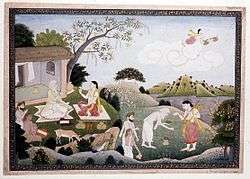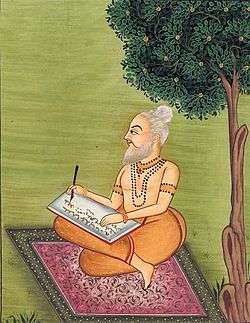Valmiki
| Valmiki | |
|---|---|
|
Sage Valmiki composing Ramayana | |
| Parents |
|
| Titles/honours |
Adi Kavi Maharishi before rishi a dacoit then narada muni converted |
| Philosophy | Dharmic movement called Valmikism is based on Valmiki's teachings. |
| Composed Ramayana & Yoga Vasistha | |
Valmiki(Sanskrit; /vɑːlˈmiːki/;[1] Vālmīki) is celebrated as the harbinger-poet in Sanskrit literature. The epic Ramayana, dated variously from 500 century BCE[2] to 300 century BCE,[3] is attributed to him, based on the attribution in the text itself.[4] He is revered as Ādi Kavi, writer of Ramayana.
Ramayana, originally written by Valmiki, consists of 24,000 shlokas and 7 cantos (kaṇḍas) including Uttara Kanda. Ramayana is composed of about 480, 002 words, being a quarter of the length of the full text of Mahabharata or about four times the length of Iliad. Ramayana tells the story of a prince, Rama of Ayodhya, whose wife Sita is abducted by Ravana, the demon-king (Rakshasa) of Lanka. The version written by Valmiki, also called Valmiki Ramayana is dated variously from 500BC to 300 BC[5] or about co-eval with early versions of Mahabharata.[6] As with many traditional epics, it has gone through a process of interpolations and redactions, making it impossible to date accurately.
Valmiki is also quoted to be the contemporary of Rama. Rama met Valmiki during his period of exile and interacted with him. Valmiki gave shelter to Sita in his hermitage when Rama banished her. Kusha and Lava, the twin sons of Rama were born to Sita in this hermitage. Valmiki taught Ramayana to Kusha and Lava, who later sang the divine story in Ayodhya during the Ashwamedha yajna congregation, to the pleasure of the audience, whereupon, King Rama questioned who they were and later visited Valmiki's hermitage to confirm if Sita, the two children claimed as their mother was in fact his wife in exile. Later, he summoned them to his royal palace. Kusha and Lava sang the story of Rama there and Rama confirmed that whatever had been sung by these two children was entirely true.
Early Life
Valmiki was born as Ratnakkardah, One day, he met the great sage Narada who questioned him of his duty. Moved by Narada's words, Ratnakara began to perform penance and chanted the word "Mara" which meant "kill". As he performed his penance for several years, the word became "Rama", the name of Lord Vishnu. Huge anthills formed around Ratnakara and this earned him the name of Valmiki. Narada declared Ratnakara to be a great Sage and Brahmin, a member of the high caste. Ratnakara, rechristened as Valmiki, learnt the scriptures from Narada and became the foremost of ascetics, revered by everyone.
The First Shloka

Valmiki was going to the river Ganges for his daily ablutions. A disciple by the name Bharadwaja was carrying his clothes. On the way, they came across the Tamasa Stream. Looking at the stream, Valmiki said to his disciple, "Look, how clear is this water, like the mind of a good man! I will bathe here today." When he was looking for a suitable place to step into the stream, he saw a crane couple mating. Valmiki felt very pleased on seeing the happy birds. Suddenly, hit by an arrow, the male bird died on the spot. Filled by sorrow, its mate screamed in agony and died of shock. Valmiki's heart melted at this pitiful sight. He looked around to find out who had shot the bird. He saw a hunter with a bow and arrows, nearby. Valmiki became very angry. His lips opened and he cried out,
- मां निषाद प्रतिष्ठां त्वमगमः शाश्वतीः समाः।
- यत्क्रौंचमिथुनादेकम् अवधीः काममोहितम्॥'
- mā niṣāda pratiṣṭhā tvamagamaḥ śāśvatīḥ samāḥ
- yat krauñcamithunādekam avadhīḥ kāmamohitam[7]
- You will find no rest for the long years of Eternity
- For you killed a bird in love and unsuspecting[8]
Emerging spontaneously from Valmiki's rage and grief, this was the first shloka in Sanskrit literature. Later Valmiki composed entire Ramayana with the blessings of Lord Brahma in the same meter that issued forth from him as the shloka. Thus this shloka is revered as the first shloka in Hindu literature. Valmiki is revered as the first poet or Adi Kavi and Ramayana, the first kavya(poem).
His first disciples to whom he taught the Ramayana were Kusha and Lava, the sons of Rama:
- प्रचेत्सोऽहं दशमः पुत्रो राघवनंन्दन |
- न स्मराम्यनृतं वाक्यमिमौ तु तव पुत्रकौ || 96:16
In another verse, it is also stated that he is from the lineage of the sage Bhargava:
- संनिबद्धं हि श्लोकानां चतुर्विंशत्सहस्रकम् |
- उपाख्यानशतं चैव भार्गवेण तपस्विना || 94:24
Incarnation
_LACMA_AC1999.127.45.jpg)
Vishnudharmottara Purana says that Valmiki was born in the Treta Yuga as a form of Vishnu who composed Ramayana and that people desirious of earning knowledge should worship Valmiki.[9]
Temples
Valmiki's ashram is in Bithoor near Kanpur. It is here that Sita stayed, gave birth to Luv and Kush, and ultimately entered mother earth.
An area in Chennai, Tiruvanmiyur derives its names from Sage Valmiki, Thiru-Valmiki-Oor. There is a temple for Valmiki located in this place, which is believed to be 1300 years old.[10][11]
See also
References
- ↑ "Valmiki". Random House Webster's Unabridged Dictionary.
- ↑ "All Indian life is here". The Guardian. 23 August 2008. Retrieved 27 April 2015.
Read 5th Paragraph
- ↑ "Sri Aurobindo on the Indian Epic Ramayana" (PDF). uwf.edu. University of West Florida. p. 2. Retrieved 27 April 2015.
read end paragraph of page 2
- ↑ Valmiki, Robert P. Goldman (1990). The Ramayana of Valmiki: An Epic of Ancient India. 1. Princeton University Press. pp. 14–15. ISBN 0-691-01485-X.
- ↑ "harking back : Myths and facts of the beginnings of Lahore".
- ↑ Goldman, Robert P., The Ramayana of Valmiki: An Epic of Ancient India pp. 23
- ↑ Sacred-Texts.com IAST encoded transliteration (modified from original source to accurately reflect sandhi rules)
- ↑ Buck, William and van Nooten, B. A. Ramayana. 2000, page 7
- ↑ Mythology of Vishnu and His Incarnations by Manohar Laxman Varadpande (2009), p. 166.
- ↑ http://www.columbuslost.com/2015/01/maharishi-valmiki-temple-at.html
- ↑ http://www.thehindu.com/thehindu/mp/2003/01/23/stories/2003012300110300.htm
External links
-
 Quotations related to Valmiki at Wikiquote
Quotations related to Valmiki at Wikiquote -
 Media related to Valmiki at Wikimedia Commons
Media related to Valmiki at Wikimedia Commons -
 Works written by or about Valmiki at Wikisource
Works written by or about Valmiki at Wikisource - Works by Valmiki at Project Gutenberg
- Works by or about Valmiki at Internet Archive
- Works by Valmiki at LibriVox (public domain audiobooks)



.jpg)
